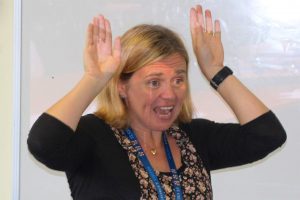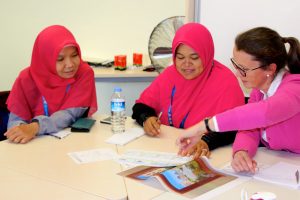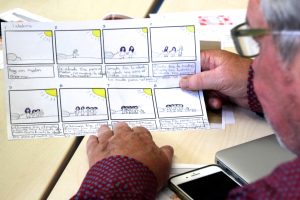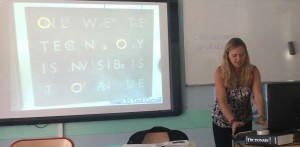My second session at #ililc4 was entitled Something old, something new and concerned the new 2014 curriculum.
My presentation is below, and I’ll explain briefly what I said as I couldn’t attach the notes without making the Slideshare look ugly!
And there are lots of links ideas and resources at bit.ly/oldlisibo (should have thought out that URL more carefully!)
As I explained on the day, when you have to submit your idea so far in advance and aren’t entirely sure how your idea will pan out, it is quite tricky to come up with a witty/apposite title. My choice of Something old Something new was mainly because I envisaged sharing some old ideas and some new ones plus some borrowed from others. However, as I came to think in more detail I began to think more about weddings!
Primary languages have had a bit of a torrid love life, being loved and then rejected by the primary curriculum, nearly getting up the aisle in 2010 but being jilted at the last moment when all was going so well. So I set out to explore the ‘prenuptial agreement’ (or Languages Programmes of Study at KS2), how we can make this ‘marriage’ work, how to convince those that are nervous about married life and how we’ll keep the spark alive.
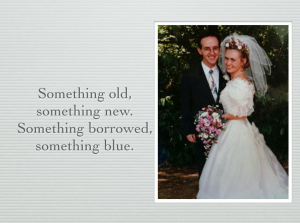
So I began by looking at the Programmes of Study, highlighting parts of the document that I found interesting.
Purpose of study – Intercultural Understanding is still really important – it’s a vital part of language learning. Providing learners with building blocks AND mortar is key if they are to be able to express what they want in the foreign language. And ‘great works of literature’ doesn’t mean Don Quijote de la Mancha, A la recherché du temps perdu or Mein Kampf at Year 3; poetry is great literature and we regularly use an extract tom Machado in Year 5 as stimulus for writing.
Aims – It’s about a balance and variety of things; a breadth of experience that leads to progression. No arguments there!
The lack of detail in the Attainment target section could be seen as a bit disconcerting but doesn’t give much guidance. However, I’m hanging on to my Key Stage 2 Framework which is still a great document; follow that and you can’t go far wrong. Measuring progress in terms of I can statements is also helpful, and there’s been a great discussion on Primary languages forum this week on what we should be looking for in terms of skills progression. (Want to join in? Join the forum or ask to join the Sharing Primary Languages wikispace)
Subject content – I highlighted that whilst it says ‘substantial progress in one language’, this does not mean that looking at other languages is precluded; in fact, I’d positively encourage it as making links between languages is a vital language learning skill. We discussed how a balance of skills can be achieved when some are more comfortable with speaking activities than the written word which seems more ‘serious’ and permanent. And we mentioned ‘the grammar question’ – it’s not such a bad thing! Nor is looking at languages such as Greek and Latin; very useful for understanding the formation of languages as I discovered on my year abroad at Universitat de les Illes Balears. Finally in this section we thought about laying those foundations for KS3. I referred back to a presentation I’d made at Language World called Bricklaying for Beginners and how bricks need mortar, and how it’s not a wall that needs demolishing at KS3; reinforcing but not knocking down!
I then took each ‘pupils should be taught to..’ statement and split them into listening, speaking, reading, writing and grammar, suggesting ideas and activities that might meet them.
There are lots of links on the wiki to many of the ideas but here are some comments:
- ‘joining in’ is very important and builds confidence as does repetition e.g storytelling, reciting rhymes and poems
- making links between graphemes and phonemes is important to enable increased fluency e.g. listening out for phonemes in songs/rhymes, sorting words, reading with your Spanish/French/German glasses so you view graphemes not as you would in your own language
- confidence with phonics is vital to teacher and learner; syllables and stress patterns too – hence my pupils’ love of stress punching! (a post about this and ‘animal symphony’ will follow shortly)
- books are brilliant – not just fiction though! Non fiction is very popular with boys and also is great for linking to other curricular areas: going back to my analogy, this ‘marriage’ is about give and take! If you can’t find suitable books, make your own as with my Storybird ¿De dónde viene el yak?
- learners can decode more complex texts without knowing every word if you provide them with the confidence to do so, embed language learning skills and discuss how languages work from the very start.
- writing doesn’t have to be in a book; whiteboards, post-it notes, mini books, Padlet, labels, paper chains, posters, your partner’s hand; they all count!
- structuring and scaffolding is fine – trapdoors are great as starters as is making human sentences and physically rearranging words. The Human Fruit machine with 3+ learners holding a large dice with 6 images of nouns/adjectives/verbs etc on them and spin is a great way of making make random sentences and exploring how you can substitute words in existing sentences to make new ones!
- I loved grammar at school; I liked the logic of it all and the patterns. So why not exploit that and make verb flowers, grammar songs and raps, dice games and so on. Use highlighters/colour to clarify grammar ( I lived by my red=accusative, green=nominative and blue=dative when learning German) be it nouns, adjectival placement, verb endings/groupings or spelling.
- Use activities that are used in other areas of the primary curriculum; learners up level sentences in Literacy all the time so why not in the foreign language? Word pyramids starting with a word and extending to a complex sentence at the base? And card sorting activities too.
So that’s the session in a (pretty big) nutshell!
(Written whilst lying flat on my back in pain so please excuse typos!)
